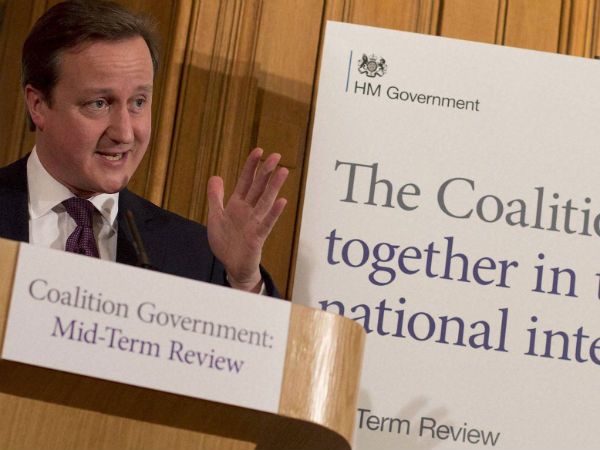Gay-marriage voting in UK: Can we Indians learn from it?
Bangalore, Feb 8: The UK lawmakers took a historic step on Tuesday towards legalising same-sex marriage, something that also raised a big rebellion within Prime Minister David Cameron's Conservative Party. The MPs approved the second reading of the bill legalising the same-sex marriage by 400-175 votes. Although the bill has to survive several more stages before it could become a law. [See: List of countries where same-sex marriage is legal]
In a 400-175 vote, MPs approved the second reading of a bill legalizing such marriage, indicating a significant majority of members support the measure. However, it must go through several more stages before it can become law.

Voting on a sensitive issue like same-sex marriage wasn't an easy affair and the Conservative Party was clearly split on the issue. Many accused Prime Minister Cameron of trying to compromise with the party's basic values and was harbouring populist politics. Cameron, along with his pro-bill supporters and central-left ally Liberal Democrats and Opposition Labour Party, voted in favour of the bill. The Labour Party also witnessed defections, but its parliamentary bloc voted strongly in favour of the move.
The division in the Conservative Party on this issue is something rarae in the history of the UK's parliamentary democracy (only 127 out of 303 lawmakers voted in favour of the bill). But this is something which should be the norm rather than the exception in a democratic system. Do we ever expect to witness such a scenario unfolding in the world's largest democracy?
In India, whenever the question arises on supporting a serious social or economic issue, the parliament is crippled by physical opposition by opposition parties who use whip on its members to ensure 'solidarity' on the issue. There is virtually no scope for expressing an individual opinion on the matter but to toe the party line. Is this how a democracy functions?
The British PM's joining hands with the Opposition to back the crucial bill is also something that will never happen in the world's largest democracy. In India, we see parties opposing the same issues that they back while in power or in the ruling alliance. On the issue of FDI, we have seen both the Congress and the BJP have backed it while in power but raising strong objection while in the opposition.
If individual opinions are not welcome, then what is the need for conducting voting in the parliament? If it is only about party-controlled democracy, then we should just ensure that tone party representative votes in such polls.
The problem is that the Indian democracy is only a procedural one and not a functional one. We have just borrowed the idea of Westminster model but is far from imbibing its essence. There is no liberty for an individual public representative here and yet we say we are democratic.
Cameron, irrespective of all criticism, did not deviate from his goal. He said wethe Conservatives should support gay marriage not in spite of being Conservatives, but because they are Conservatives. His supporters and also the Opposition strongly believe that whatever the detractors feel, the voting has actually helped the nation move forward.
Can we even think a Sushma Swaraj backing Manmohan Singh on the issue of FDI in India? And even in cases where we see a Mulayam Singh supporting Singh, it is done only to fulfil political ambitions rather than to accomplish anything for the nation's benefit.
Cameron's alliance with the leftist Liberal Democrats to form the government in 2010 had raised quite a few eyebrows for it was felt that it was a opportunist alliance but Tuesday's voting showed that party ideologies don't really matter if one has the will to do something for the greater good.
We had two similar instances in the recent past, in 2008 and in 2012, when two allies had a serious fall-out with the senior alliance partner over backing a national cause. In both cases, we saw the government was rocked by the lesser allies who preferred their so-called 'pro-people' ideologies above the nation.
Still a long, long way to go for us. Sheer size doesn't make us the largest democracy.
OneIndia News


 Click it and Unblock the Notifications
Click it and Unblock the Notifications



































